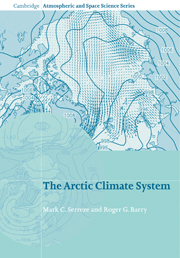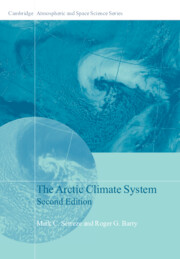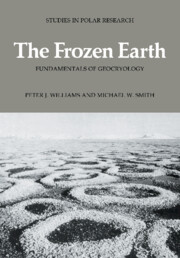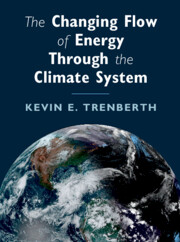The Arctic Climate System
The Arctic can be viewed as an integrated system, characterised by intimate couplings between its atmosphere, ocean and land, linked in turn to the larger global system. This comprehensive, up-to-date assessment begins with an outline of early Arctic exploration and the growth of modern research. Using an integrated systems approach, subsequent chapters examine the atmospheric heat budget and circulation, the surface energy budget, the hydrologic cycle and interactions between the ocean, atmosphere and sea ice cover. Reviews of recent directions in numerical modelling and the characteristics of past Arctic climates set the stage for detailed discussion of recent climate variability and trends, and projected future states. Throughout, satellite remote sensing data and results from recent major field programs are used to illustrate key processes. The Arctic Climate System provides a comprehensive and accessible overview of the subject for researchers and advanced students in a wide range of disciplines.
- Equips reader with outline of early exploration and growth of modern research
- Contains results from the latest field programs providing the most modern insights into key Arctic processes
- Clear discussion of difficult concepts makes this book accessible to the non-specialist
Reviews & endorsements
'… comprehensive and up-to-date book … 172 highly informative, up-to-date illustrations … A wealth of valuable information about the recent climate of the Arctic is presented … [in] this excellent volume … This is one of the best books on the Arctic climate system and should be required reading for all scientists and students engaged in the study of the Arctic environment. Acquisition of this highly significant and useful book should be considered an involvement in our future understanding of climate change in this vitally important part of the world.' Polar Geography
'I read this book with great interest … It is different from other books in so far that it considers the Arctic as a system, in which the ocean, land and atmosphere are intimately linked … a nice presentation of the successes and shortcomings of models is presented, presently a major effort in the field of atmospheric sciences … It is a well-written chapter, [chapter 10] definitely worth reading … Summarising, I do like this book, which indicates current knowledge concerning the climate of the Arctic and its interaction with the lower latitudes as of today. The authors made a major effort to include recent advances, which can be seen from the literature and includes papers published in 2005 … This book will be essential for all climatologists interested in the Arctic.' Journal of Polar Record
'The authors demonstrate their expert knowledge and understanding of the topic of climate and provide a comprehensive coverage of this topic, which is likely to appeal to and be useful to many readers.' Journal of Glaciology
'Researchers and students will delight in The Arctic Climate System, and I can honestly report that if I could have only one text or resource on Arctic climatology, this would be it. Perhaps the best recommendation I can give is to report that I have already adopted this text for the graduate course that I teach in Arctic Climate Dynamics. I expect it will maintain this place for many years and future editions.' Arctic: Journal of the Arctic Institute of North America
Product details
October 2005Adobe eBook Reader
9780511128684
0 pages
0kg
164 b/w illus. 8 colour illus.
This ISBN is for an eBook version which is distributed on our behalf by a third party.
Table of Contents
- 1. The evolution of knowledge about the Arctic and its climate
- 2. Physical characteristics and basic climatic features
- 3. The basic atmospheric energy budget
- 4. The atmospheric circulation
- 5. The surface energy budget
- 6. Precipitation, net precipitation and river discharge
- 7. Arctic ocean-sea ice-climate interactions
- 8. Climate regimes of the Arctic
- 9. Modelling the Arctic climate system
- 10. Arctic paleoclimates
- 11. Recent climate variability, trends and the future.








